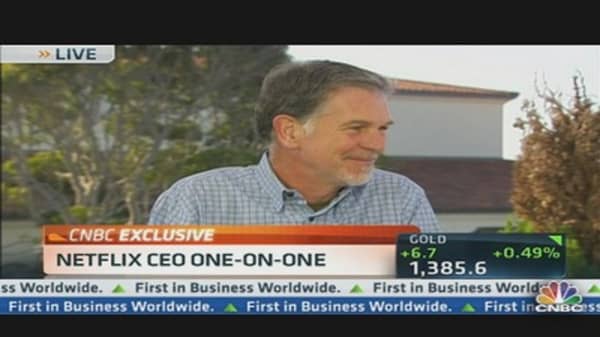Despite many who would like to see a larger partner buy Netflix, co-founder and CEO Reed Hastings said it is better off on its own. Hastings spoke with CNBC's "Squawk on the Street" on Wednesday from California.
When asked whether an acquisition by Microsoft or another company is possible, Hastings said, "Netflix is really best independent because we are on so many platforms. We do incredible work on the Microsoft platforms, the Google platforms, the Apple platforms and on all the TVs. The value of Netflix is really when it's on every screen that you want to use."
Shares fell from session highs on the comment.
(Click here for the latest on Netflix shares.)
Netflix is not on the BlackBerry Z10 smartphone, though, which Hastings attributed to that company's traditional market position.
Netflix is "really focused on entertainment screens," he said. "BlackBerry has been a tremendous work device. An entertainment platform is what we're focused on."
Another major provider of streaming video—Hulu—would be more of a threat as a stand-alone company, Hastings said. "If they were independent, they would have the most hunger. If they're in another big company, I don't think which big company would matter too much."
He also dismissed speculation about price increases, saying that a larger user base will let Netflix keep pricing stable, and he characterized Netflix's relationship with activist investor Carl Icahn as "great."
For video overall, Hastings sees "4K" technology as an important emerging trend; 4K is an ultrahigh definition format, with about twice the resolution of a traditional HDTV.
"It's just an incredible video quality," he said, predicting that eventually Internet streaming will be in this format.



